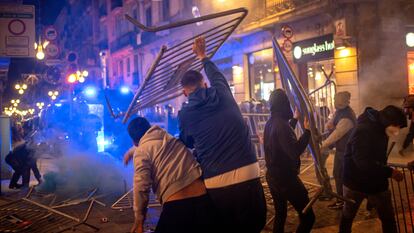Police make 32 arrests in Madrid, after second night of disturbances across Spain
Violent demonstrators have taken to the streets this weekend in cities including Barcelona, Bilbao and Málaga to protest coronavirus restrictions such as the nighttime curfew
A total of 32 people were arrested in the center of Madrid on Saturday night, after an unauthorized demonstration took place to protest against the nationwide curfew that has been put in place across Spain in a bid to curb the spread of the coronavirus.
The disturbances came after similar scenes in other Spanish cities over the weekend, including Barcelona, Bilbao, Logroño, Málaga, Valencia and Santander, among others.
The demonstrators in Madrid set fire to trash containers in the capital’s Gran Vía boulevard as well as damaging store fronts and other commercial premises – in particular banks – in the area. Three National Police officers were left with light injuries, according to a spokesperson from the central government’s delegate in Madrid.
The protest had not been officially communicated to the delegation, and was organized via social media. The demonstrators chanted slogans such as: “Madrid says enough,” “Stop the political mafia, stop the dictatorship,” and “Madrid is being ruined,” among others.
At around 10pm, officers cleared the protestors from the central Puerta del Sol square, and the crowds moved to the Plaza de Isabel II. There, a hundred or so people chanted slogans against the Spanish prime minister, Pedro Sánchez. Some of them then moved to the Plaza de España, where they set fire to trash containers and tried to use barricades to cut off the Gran Vía.
Street chases then ensued and protestors threw objects at police vehicles. The situation lasted around 20 minutes. Those arrested face public order and damages offenses.
📌El @DGobiernoMadrid @conJoseMFranco ha estado en permanente comunicación con Jefatura Superior de @policia en #Madrid para conocer de primera mano las protestas que se han llevado a cabo en la Puerta del Sol y Gran Vía para disolverlas de manera pacífica al no estar comunicadas pic.twitter.com/2UTz9O0xY8
— Delegación del Gobierno en Madrid 🏛️ (@DGobiernoMadrid) November 1, 2020
A tweet from the central government delegation in Madrid with images of the disturbances.
Meanwhile, in the northern city of Bilbao there were four arrests at similar protests. In Vitoria, there were acts of vandalism in the center of the city while in San Sebastián demonstrators also set fire to trash containers. The central government delegate in La Rioja reported that seven National Police officers were injured after serious incidents in the city of Logroño, with at least six people arrested. In Málaga there was also damage caused by protestors and fires were set. Four people were arrested and an officer was injured in Santander, where 50 people demonstrated against the restrictions in the central Ayuntamiento square.

Prime Minister Pedro Sánchez has spoken out against the violence and called the “violent and irrational” behavior “intolerable,” and perpetrated by violent minority groups. “This is not the path,” he wrote on Saturday via Twitter, calling for “responsibility, unity and sacrifice” in order to beat the pandemic.
The violent scenes began on Friday night in Barcelona, when another unannounced protest saw “very violent and organized far-right groups” meet in the Plaza Sant Jaume square, according to the head of the regional police, Pere Ferrer. Some of the demonstrators threw barriers and fireworks at officers, and police charges ended with 12 arrests, including two minors.
There were similar protests on Friday night in Burgos and Cantabria.
Based on reporting by F. Javier Barroso, Rebeca Carranco, Juan Navarro.
English version by Simon Hunter.
Tu suscripción se está usando en otro dispositivo
¿Quieres añadir otro usuario a tu suscripción?
Si continúas leyendo en este dispositivo, no se podrá leer en el otro.
FlechaTu suscripción se está usando en otro dispositivo y solo puedes acceder a EL PAÍS desde un dispositivo a la vez.
Si quieres compartir tu cuenta, cambia tu suscripción a la modalidad Premium, así podrás añadir otro usuario. Cada uno accederá con su propia cuenta de email, lo que os permitirá personalizar vuestra experiencia en EL PAÍS.
¿Tienes una suscripción de empresa? Accede aquí para contratar más cuentas.
En el caso de no saber quién está usando tu cuenta, te recomendamos cambiar tu contraseña aquí.
Si decides continuar compartiendo tu cuenta, este mensaje se mostrará en tu dispositivo y en el de la otra persona que está usando tu cuenta de forma indefinida, afectando a tu experiencia de lectura. Puedes consultar aquí los términos y condiciones de la suscripción digital.









































